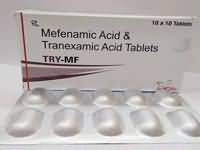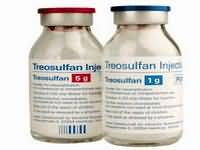Interferon gamma 1b

Interferon gamma 1b
CLINICAL USE
Adjunct to antibiotics to reduce the frequency of serious infections in patients with chronic granulomatous diseaseDOSE IN NORMAL RENAL FUNCTION
50 mcg/m2 3 times a weekor 1.5 mcg/kg 3 times a week if surface area <0.5 m2PHARMACOKINETICS
DOSE IN RENAL IMPAIRMENT
GFR (mL/MIN)
DOSE IN PATIENTS UNDERGOING RENAL REPLACEMENT THERAPIES
IMPORTANT DRUG INTERACTIONS
Potentially hazardous interactions with other drugsAvoid with vaccinesADMINISTRATION
Reconstition
–Route
SCRate of Administration
–Comments
–OTHER INFORMATION
Pre-treatment with paracetamol is recommended to reduce incidence of flu-like symptomsInterferon up-regulates the cell surface presentation of class II histocompatibility antigens, which raises the possibility of drug-induced allograft rejection. There are numerous clinical reports of allograft rejection, acute renal failure and graft loss after interferon therapy. Hence extreme care should be exercised in the use of interferon after renal transplantationInterferon is metabolised primarily in the kidney. It is excreted in the urine, but is reabsorbed by the tubules where it undergoes lysosomal degradation. In patients undergoing haemodialysis, the interferon molecule may accumulate as it is too large to be dialysed and will not undergo renal degradation. Hence, the dose may need to be adjusted
See how to identify renal failure stages according to GFR calculation
See how to diagnose irreversible renal disease
Home








